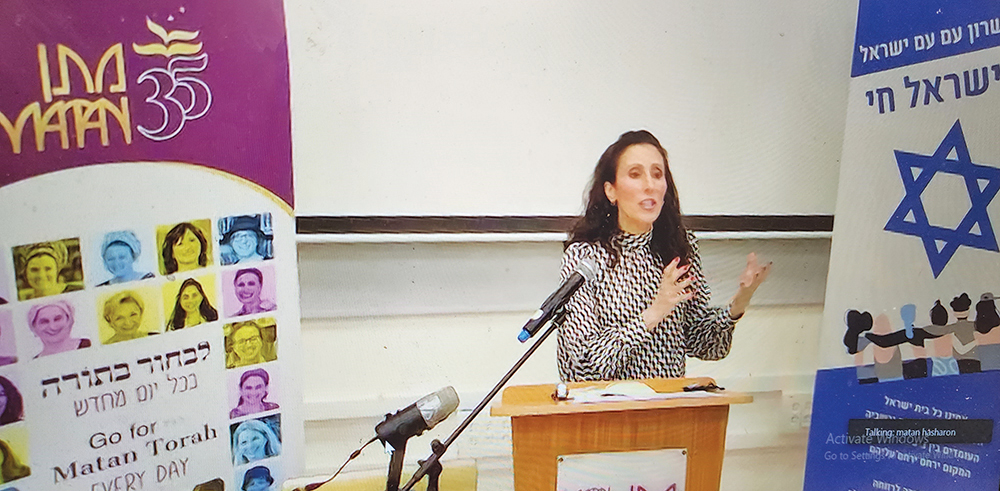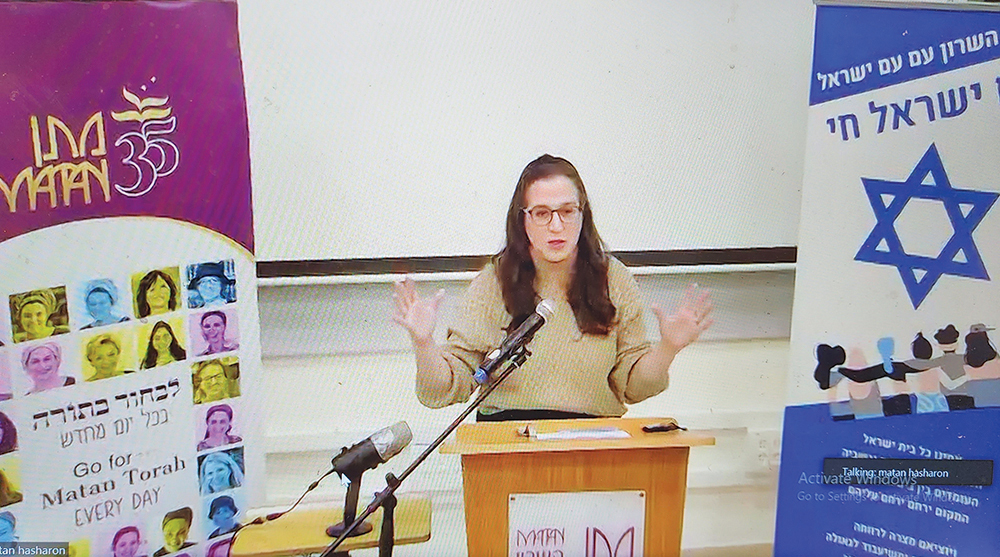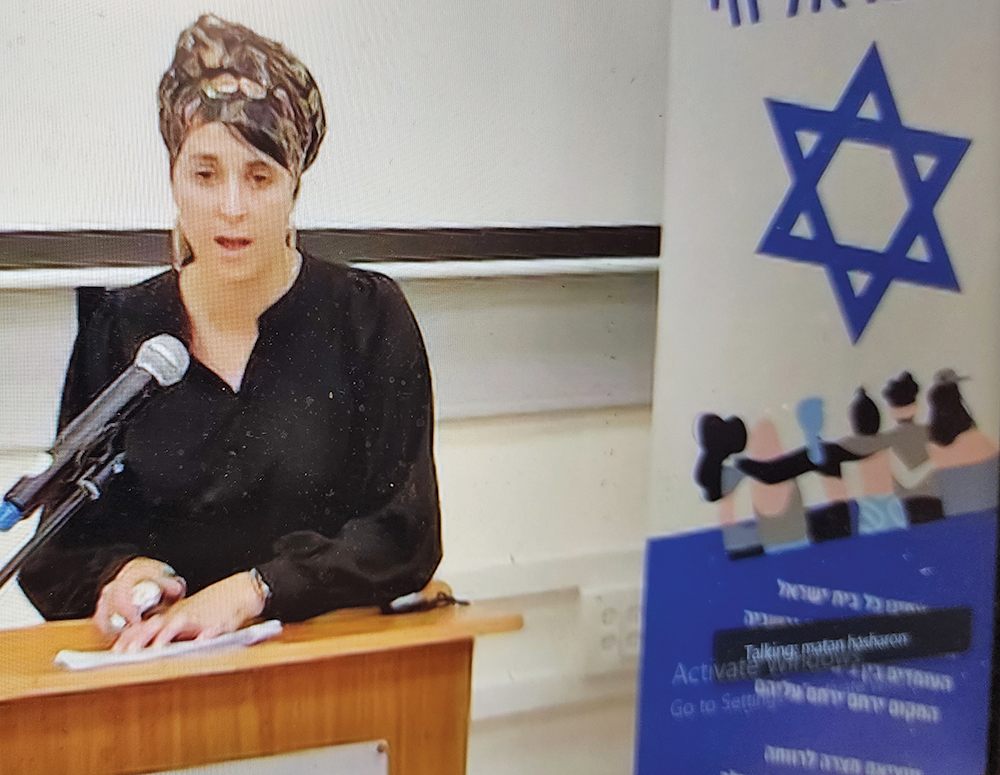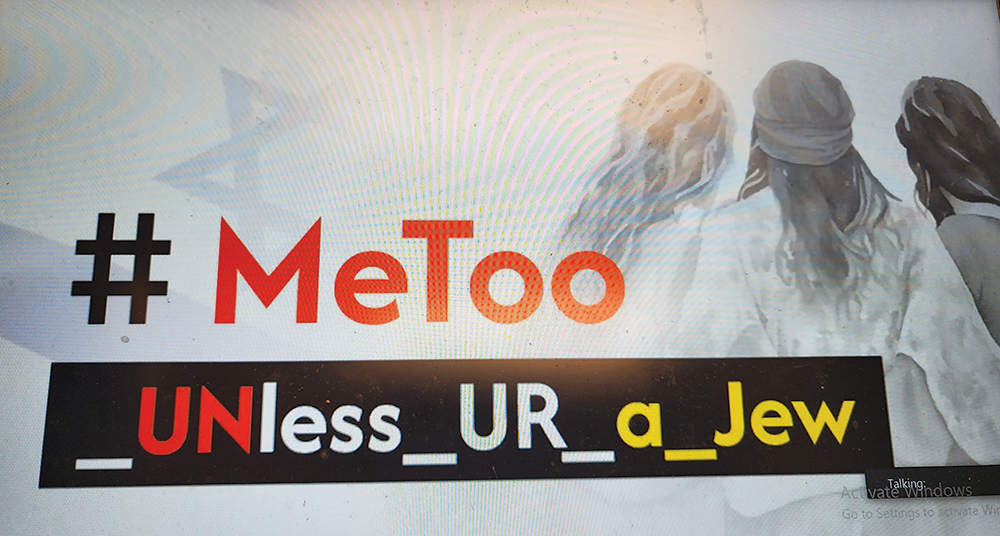
A global event was held on Sunday, January 7 presenting the physical, spiritual and legal aspects of the horrific violence perpetrated against Israeli women on October 7. Hosted by Matan Hasharon (Matan) in Ra’anana, the program aimed to clarify Israeli and worldwide Jewry’s role in protesting the world’s failed response to the atrocities that were committed. Over 500 men and women participated in person from central Israel and via Zoom from the United States, Canada, South Africa, Australia, England and Switzerland. There was also a contingent from Uganda joining via Zoom, where Matan scholars are teaching a group of students planning conversion.
Matan, a Jerusalem and Ra’anana-based national/international beit midrash for women, was stunned by the deafening silence of the #MeToo women’s groups and movements after the rapes and murders of Israeli women by Hamas on October 7. That gave rise to the #MeToo_Unless_UR_a_Jew global grassroots campaign.

Rabbanit Oshra Koren, founder and director of Matan Hasharon, said: “We were shocked and disappointed by the world’s reaction. We needed to connect and base our reaction on Torah. Our Torah voice must be amplified to protect women, their rights and the sanctity of the home.”
The joint efforts of the Matan staff brought the resulting program together to include presentations by Orit Sulitzeanu, executive director of the Association of Rape Crisis Centers in Israel; Yael Leibowitz, a Tanach scholar and lecturer; and Paula Kweskin Weiss, a human rights lawyer and filmmaker.
Rabbanit Koren welcomed attendees and partnering organizations and opened with a brief dvar Torah, pointing out that Hashem already knew the answer when He asked Cain where his brother Abel was. Cain was asked the question because Hashem was hoping he would take responsibility for what he did to his brother. “We stand here with the families of those impacted by October 7 and loudly affirm that we are the keepers of our Jewish brothers and sisters. We can’t look the other way when Jews are in the path of harm. We stand for those with no voice, we will not be silent, we will not be victims, and we will take action.”

Emcee Tammy Levy introduced Sulitzeanu by noting that #MeToo burst on the world stage in 2017 and in a watershed moment affirmed that women’s voices were no longer marginalized. That moment ended in 2023 when Hamas’s destruction of Israeli villages and kibbutzim included barbaric killings and horrific sexual violence. “Where was the United Nations? Where was the group UN Women? Where was #MeToo?” It was unacceptable that the first acknowledgement of the violence was 50 days after the event.
Sulitzeanu provided a brief history of handling of sexual violence against women in Israel. The first crisis center was established in Tel Aviv in 1978 and now there are eight others across the country that formed an association to work together raising awareness and changing laws.
Hamas’ carefully planned, vicious attacks on October 7 included “systematic sexual abuse by terrorists.” Reports of sexual violence were not initially reported in the Israeli media so as not to embarrass or hurt the families of the victims. “Israel is a small country and everyone knows everyone. Nobody wanted to embarrass the victims or families now or when people referred to the events in the future.” But word had to get out to show the world what happened.

The problem is that firsthand evidence and testimony is needed to prosecute the perpetrators. The majority of the victims of October 7 cannot testify. In accordance with Jewish law, burials took place quickly and without the evidence needed. Survivors and released hostages have undergone much emotional and physical trauma where even talking about what happened can cause additional harm. Soldiers and paramedics on the scene have testified as to what they saw, but it is not firsthand testimony and may not be considered legal testimony in a court of law.
What should Israel as a society do? What should the organization do? The entire country has suffered trauma. The war is still not over and will likely last for years. A “regular” rape survivor needs over two years of therapy; what the present situation requires is unknown. There are lessons to be learned from the aftermath of war crimes against women in the Bosnian War. What is known is that a new set of laws will need to be written to accommodate these unprecedented atrocities.
Kweskin Weiss practiced human rights law for years and became a documentary filmmaker focusing on women’s rights. “The stories we heard about what happened to women are not just stories; they are actual women who lived beautiful lives. We need to provide dignity to these women, not just justice.”

The UN Women organization was developed to ensure equality in the treatment of women worldwide with binding resolutions and international laws. It should have made a statement condemning the actions of October 7, especially when immediate action was taken to condemn similar violence in Sudan and Ethiopia. Naively, initial thoughts were that no statement was made because the group was unaware of what had taken place. Evidence and a letter signed by 150 legal experts was submitted, and still nothing was said. The international silence continues and experts in Israel are gathering evidence to have a tribunal to bring formal charges.
The program concluded with the singing of Hatikva.
Rabbanit Koren strongly advocates for everyone in the United States to set up community meetings with Jewish and non-Jewish neighbors, utilize social media, and speak out to create awareness and get the facts out. “Never again is now! We need to speak out and not be embarrassed about our Jewish identity. We aren’t the same people we were during World War II—we have the IDF and our country. We should be proud,” she said.

For more information visit: https://www.matan.org.il/en/
Deborah Melman is a staff writer at The Jewish Link.










